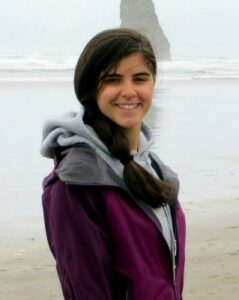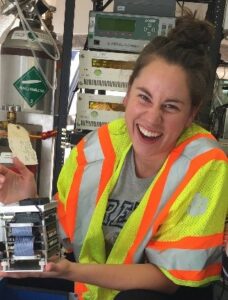Air Pollution in High Definition: Building Low-Cost Sensor Networks & Community Partnerships
Presented by the Women Chemists Committee — All Are Welcome
Time
10:30 – 11:00 a.m. Chatting
11:00 a.m. Talk and Discussion
Reservation
Please register no later than Friday, Sept. 17, 2021 before 10:30 am, as we need your email address to send you the Zoom link.
Zoom meeting will be shared with attendees on or before the day of the event via Brown Paper Ticket: https://www.brownpapertickets.com/event/5159757
Cost: Free
For more information visit our website at www.calacs.org or email office@calacs.org.
About the Speakers

Dr. Alexis Shusterman
Dr. Alexis Shusterman completed her PhD in atmospheric chemistry at the University of California, Berkeley while working with Prof. Ronald Cohen. Her graduate work centered around the construction of BEACO2N, a high-density network of more than three dozen low-cost sensors capable of providing community-level air quality reports throughout the San Francisco Bay Area. During graduate school, Alexis worked with science communication and outreach organizations nationwide to spread climate change and environmental justice awareness, winning recognition in the UC Berkeley Grad Slam, the University of California Carbon Slam, and the American Chemical Society Chemistry Champions competitions. Now a lecturer in the UC Berkeley College of Chemistry, Alexis (or “Dr. S” to her students) now dedicates herself to delivering high quality chemical education full time.

Dr. Chelsea Preble
Dr. Chelsea Preble earned her PhD in Environmental Engineering from UC Berkeley in 2017, and is now an Assistant Research Engineer in the Department of Civil and Environmental Engineering at UC Berkeley and affiliate of the Energy Technologies Area at Berkeley Lab. In her work, she seeks to better understand air pollution trends, sources, and controls in impacted communities and to evaluate the real-world emissions impacts of new regulations and alternative energy technologies. Her research includes characterizing in-use emissions from heavy-duty diesel trucks and commercial harbor craft, developing community-based air quality sensor networks, and quantifying emissions from organic waste diversion systems.
Abstract
Measuring atmospheric pollutants at high spatiotemporal resolution has the potential to help identify problematic sources as well as pinpoint communities facing disproportionate risks. Most traditional air quality monitoring campaigns, however, have been necessarily sparse in their resolution owing to the significant upfront and operational costs of high-precision and high-accuracy instrumentation. We explore the intersection of this measurement challenge with the issue of environmental justice in the United States and make an argument for the benefits of tracking air pollution at the neighborhood scale using low-cost monitoring techniques. We also present initial results from community air quality studies in West Oakland and Richmond, two San Francisco Bay Area communities that are burdened by diesel particulate matter pollution. In these studies, we deployed custom-built, low-cost black carbon (BC)—or soot—sensors outside of community members’ homes and businesses. These dense networks captured seasonal trends in ambient BC on a block-by-block basis and found that the spatiotemporal patterns in BC concentrations were driven by truck activity. Through meaningful partnerships between researchers and key community stakeholders, these collaborations created actionable datasets that advance both science and advocacy goals as part of broader Community Air Protection Program monitoring efforts (AB 617).
